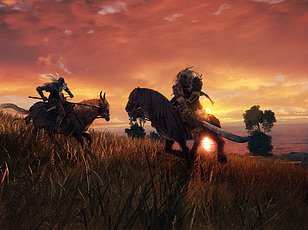I'm a professional gamer and people pay me thousands to finish games for them
- Marko Uslinkovski is a 36-year-old professional gamer from North Macedonia
- He says his company can make $50k a month in revenue beating tricky bosses
If you grew up obsessed with gaming, them you were probably told by various relatives that you could never make a living playing video games all day.
Yet while that might once have been true, there is now a growing industry of professional gamers for hire making serious money with their hard-earned skills.
Marko Uslinkovski is a 36-year-old professional gamer from North Macedonia who makes a living beating games for people who don't have time to do it themselves.
With a team of 50 'boosters' Marko told MailOnline his company, Captain Carry, can turnover between $30,000 to $50,000 in a good month.
Marko told MailOnline: 'These new games are extremely difficult, so we're like the last ditch effort for people that are borderline giving up.'
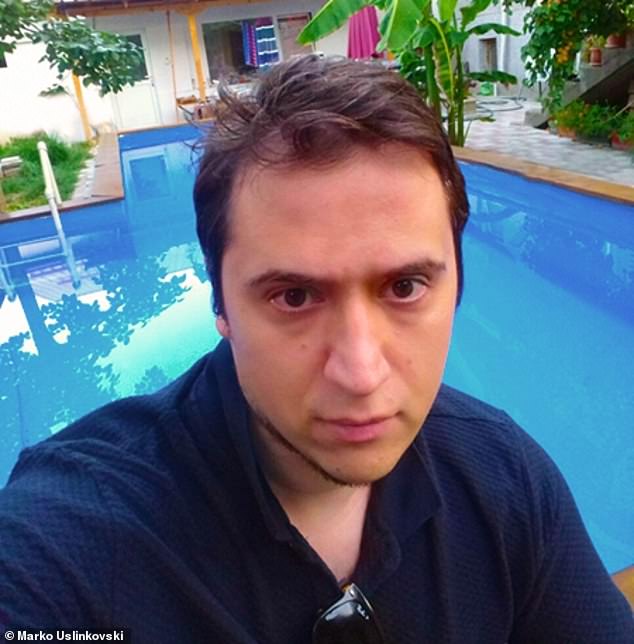
Marko Uslinkovski (pictured) is a 36-year-old professional gamer from North Macedonia who makes a living beating games for people who don't have time to do it themselves

If you grew up obsessed with gaming, then you were probably told by various relatives that you'd never make a living playing video games all day (stock image)
Like so many who end up with a life-long passion for video games, Marko was hooked from his very first taste.
His father, a tech enthusiast who liked to solve quantum physics equations for fun, bought Marko and his brother a Commodore 64 when he was just six years old.
While his father had hoped Marko would learn about circuit boards and code, he and his brother instead poured hours into competitive video games.
He recalls: 'We would fight over everything, and in video games, you can play against each other without bruises.'
By the time he and his brother reached high school, they were rapidly becoming top players in early online video games like DOTA.
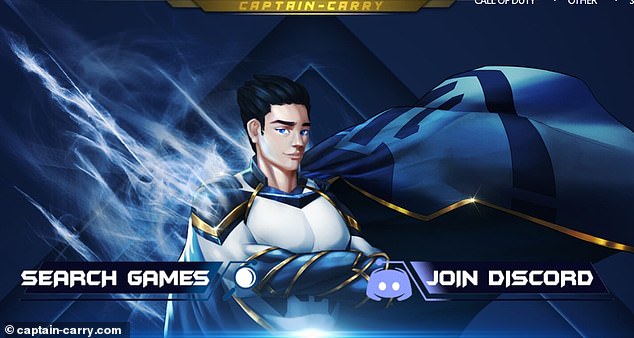
For many, playing video games for a living is a dream. But a few skilled gamers have actually made that a reality by offering 'carry' or 'boosting' services in popular video games like those of 'Captain Carry' AKA Marko Uslinkovski
However, back then this wasn't exactly seen as a route towards a successful career.
Marko says: '25 years ago, nobody would pay you to play video games because there was no market.
'In high school, obviously, there was judgment because I was playing video games all the time.
'There's no money, no recognition, you're locked up in your room; so people start getting worried.'
However, thanks to what Marko describes as his stubbornness, he persisted and kept playing video games all the way through school.
'When there is a soccer tournament, it's in a big field, there's people, popcorn; there is this whole big thing going on,' he says.
'Now in video games, we are basically locked in a basement with poor air quality and 10 people around a PC, so it's this pathetic picture.
'If you look from the outside, it's bad. But there was a lot going on in the screens and in our brains.'

Today, gaming events like the League of Legends world tournament (pictured) fill stadiums. But when Marko started he described it as being 'locked in a basement'
And, were it not for the release of one very important game, Marko might have never gotten out of that poorly ventilated basement.
In May 2012, Blizzard Entertainment released Diablo 3, a game in which players guided their characters through deadly dungeons and hordes of enemies.
What made Diablo 3 different from previous games was its brutal, overtop, and probably unfair level of difficulty.
The game's hardest mode, named 'infernal difficulty' was so challenging that players needed extremely rare and powerful items to stand a chance.
However, those items had astronomically rare chances of 'dropping' - perhaps only appearing 0.001 per cent of the time.
That created a thriving market for those with the skills and free time to grind through Diablo 3's most challenging dungeons.

In 2012, the game Diablo 3 proved to be so difficult that players were willing to pay thousands in real currencies to get their hands on in-game items
The game even had a virtual market called the 'Real Money Auction House' which let players list pieces of gear for up to $250 a piece and get paid over PayPal.
However, that $250 cap didn't stop the prices of some items from spiralling out of control on unofficial forums.
In one instance, Marko sold a single item 'off-hand sword' for $9,000 to a fellow fan.
Blizzard would eventually axe the Auction House and put an end to the Diablo 3 boom, but not before Marko realised he could turn gaming into a full-time job.
Marko and his brother rebranded their Diablo 3 website as 'Captain Carry' and now sell services for a wide range of different video games.
Customers pay Marko and his team to log into their accounts in order to level up characters, obtain rare in-game items, and even beat bosses.
Over the years he has employed about 2,000 different 'boosters', as he calls the company's freelance pro-gamers, but generally has about 50 on call at a time.

Marko soon moved on from Diablo and now offers most of his services in the game Elden Ring and its DLC Shadow of the Erdtree (pictured)
Not every video game has the right mix of longevity and difficulty to make it the perfect target for Marko's services so the company's income can vary quite widely.
Marko says: 'If it's summertime, there are no new video games, and people are on vacation then that's a recipe for inactivity in video games.
'It can range from 10k to 50k sometimes, but the profit margin might be as low as 10 per cent because you've spent more on ads.'
However, recent developments in the world of video games have led to something of a boom in demand for Marko's services.
In 2022, legendary game designer Hidetaka Miyazaki teamed up with Game of Thrones author George R.R Martin to create a game of epic proportions.
Marko says: 'Elden Ring is just one of those games where everything is good.
'In the food industry, if something has sugar and salt that's what hits the dopamine receptors. In video games we want the content to be both beautiful and difficult.'


Elden Ring was the brain child of legendary designer Hidetaka Miyazaki (right) and Game of Thrones author George R.R Martin (left)
Elden Ring's extreme skill requirement and near vertical learning curve have given it something of a legendary reputation.
The game's recent expansion, titled 'Shadow of the Erdtree', takes that difficulty to almost absurd extremes.
Marko says even skilled players may need to spend up to 30 hours in-game levelling up and finding gear just to take on the simplest bosses.
That difficulty means that most players simply don't have time to do the grinding necessary to actually enjoy the game.
Marko says: 'Some of our customers are professionals like doctors or lawyers so they just don't have time to spend five hours a day playing.
'They come to us so, when the weekend comes, they can jump in and play in a particular zone or certain boss.'

Elden Ring is so difficult that many customers pay Marko and his team to beat bosses for them on their accounts
Other customers might want to play with their friends but don't have time to reach their friends' levels so call on Marko to help them catch up.
Players will pay $6.49 for one of Marko's team to log on and beat the boss for them.
Or, for an additional fee, they can play co-op with one of the pros or even watch a live stream of Marko's boosters beating the boss on their account.
Players can also pay up to $8 for a specific in-game item or up to $220 for their character to be brought to max-level.
While it might seem like an odd thing to spend your money on, Marko says he is saving players weeks of work and letting them enjoy their games without wasting their time.
He says: 'It's like going to the dentist: if you want to fix your own teeth you need to have all these tools and go through all this pain, but we can just jump in and get it done in 15 minutes.'
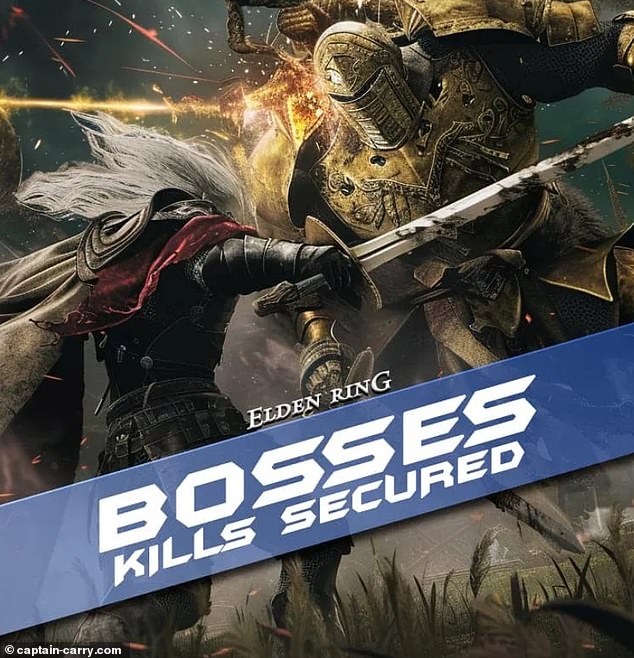
Marko says his company can bring in revenue between $10,000-$50,000 depending on how popular recent games have been
However, just like any job, being a full-time gamer does not come without its drawbacks.
The biggest issue for Marko is the unsociable hours that being an on-call gamer requires.
He says: 'Because most of the customers are in the US you're going to start working about 5 pm. When you have to sleep are also prime working hours because about 1:00 am is when the West Coast starts to come home from work.'
Marko says he is also concerned about the effects that spending hours in front of the computer might be having on him in the long run.
Additionally, the site has been hit by several cyberattacks, including one DDOS campaign by Russian hackers, which all adds to the stress of managing a small business.
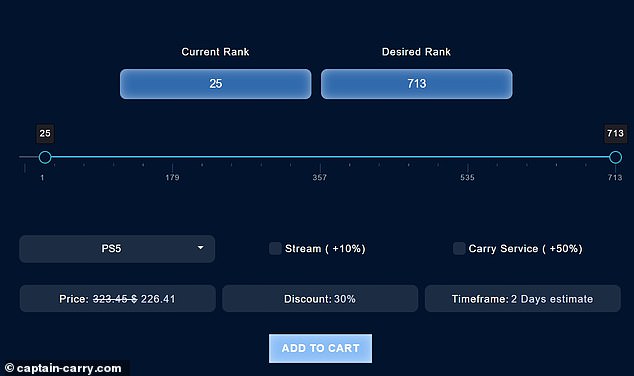
Some players also pay up to $220 for one of Marko's professional players to level their characters up in game
However, in the end, Marko says that all these drawbacks are worth it to be able to play games for a living.
'It's not like I'm missing out on much on much. I don't have much of a nightlife but what's that apart from drinking alcohol, driving fast, and beating up other people?' he said.
'I think I got lucky with my character traits; I was a bit anti-social since youth but now I can justify not going somewhere because I can say I have to work.'
And while a steady job with a stable income does have its appeal, Marko doesn't seem overly concerned with making money.
'I know there are some companies that are making more but I'm not that kind of guy, I'm more about growing things in my yard and tending to animals,' he added.
'I grew up in a village so I didn't have a dream to be some rich guy, I think that's about the dumbest dream you could have.
'This is all about the video games, even if I made 10 per cent of what I do I would take it just to play games for a living.'





























